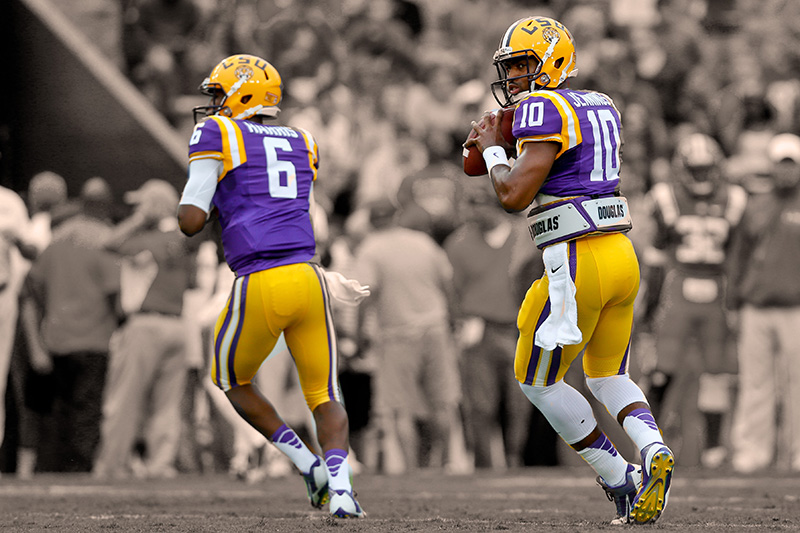Miles waiting for someone to seize starting quarterback job
The LSU Tigers are in Year 2 of an ongoing quarterback battle between Anthony Jennings and Brandon Harris, and head coach Les Miles doesn’t appear to be any closer to making a decision on his signal caller for the fall.
Jennings won the starting job last season, then promptly led the SEC’s worst passing offense in 2014, completing fewer than 49 percent of his throws on the year. Now the competition has opened back up, and one quote Miles gave local media members last weekend should give you an idea of what he’s looking for out of this competition.
One of the most candid and accurate quotes by Les Miles in recent years follows on his QB situation from yesterday's scrimmage:
— Glenn Guilbeau (@LSUBeatTweet) March 29, 2015
“To find a real quality QB and have separation from 1 to the other, that’s what I’m looking for. I’m not necessarily seeing that,” Les said.
— Glenn Guilbeau (@LSUBeatTweet) March 29, 2015
For what it’s worth, in the scrimmage referenced above (a 100-snap situational scrimmage as part of the spring practice schedule), Jennings completed 9 of 14 throws (a 64.3 percent completion rate) for 200 yards and two touchdowns; Harris completed “10 or 12” of his 22 attempts, according to The Advocate in Baton Rouge.
Miles also told The Advocate that “Jennings probably has performed better on more days; and on other days, it’s been Brandon Harris.” That’s not exactly a ringing endorsement for either quarterback.
Clearly neither player has been able to distance himself from the other, meaning although Miles may have to choose a starter for the fall there isn’t a quarterback between the two he truly trusts with the job. For now, it appears the winner may be chosen by default on a “lesser of two evils” basis, rather than on the basis of merit.
That’s scary for a team loaded with talent that just experienced the pitfalls of an inability to throw the football. What Miles wants, and what either Jennings or Harris must do is step up and seize the job. Right now the two signal callers appear to be aiming to outdo one another, while Miles would rather they focus on themselves and leave no doubt they should be the starter.
If neither can step up, LSU may find itself in a situation comparable to the quarterback carousel Vanderbilt employed last season. The Commodores gave four different quarterbacks at least one start during the season as none of the four was able to prove himself the obvious choice for the job. The result was the SEC’s second-worst passing offense and a putrid three-win season.
Meanwhile, at Alabama, Blake Sims came from almost out of nowhere to steal the job away from Jacob Coker, who many expected to start the Tide’s season-opener after transferring in from Florida State to replace A.J. McCarron.
Coker was slow in learning Lane Kiffin’s offense after arriving on campus during the summer months, while Sims was able to pick up the new offense right away and prove he was the guy.
Coker received reps here and there early in the season, but it was obvious Sims was the man for the job, and the former defensive back-turned-quarterback closed the year on the All-SEC second team.
It was never about topping Coker, but about proving he was the right man to lead the SEC’s best shot at a national title in 2014. And he did follow through in winning the SEC crown and earning a playoff berth, although Alabama fell apart in a semifinal loss to Ohio State with Sims at the helm.
Nevertheless, Jennings and Harris must follow the model laid out by a perennial winner at Alabama, not by a longtime lovable loser at Vanderbilt. The two must stop focusing on one another and start focusing on commanding the LSU offense.
Because Jennings is a junior and Harris is a sophomore, whoever wins the job might force the other to transfer down the line or risk spending a college career riding the bench. There’s no questioning that pressure has affected both quarterbacks.
But the fast track to success requires focus on one’s own play. The more Jennings and Harris look over their shoulders, the less they and their LSU teammates have to look forward to come the fall.

